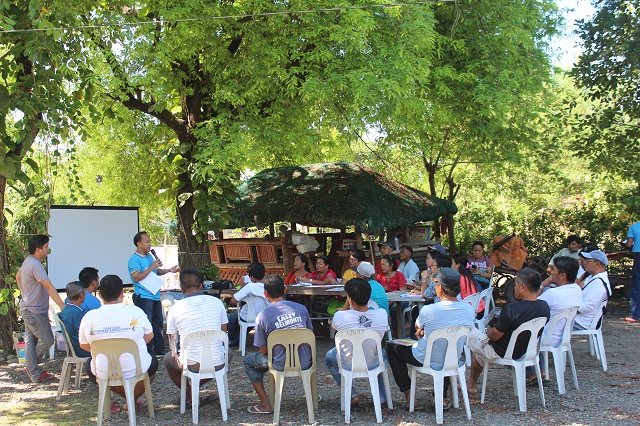
For people in the city area, “see you at SM” means “meeting at a shopping mall”. Interestingly, to the facilitators and farmer-cooperators of the Rice Business Innovations System (RiceBIS) Community Program at Brgys. Macarse and Mayamot, Zaragoza, Nueva Ecija, “SM” stands for “Silong ng Mangga”.
Such was the expression during the program’s early years of implementation when the villages in the area still had not much – no facilities nor offices, just nature’s gifts. Fast forward to today, the “password” still rings a bell, nature still generously gives, and yet both Macarse and Mayamot communities are considerably more progressive.
Meeting mentality
Zaragoza is a 3rd class municipality in southern Nueva Ecija where agriculture, mainly rice production, is the chief economic resource. In 2017, RiceBIS led by Dr. Aurora Corales of PhilRice made a nationwide search for rice-farming barangays to be its pilot sites. The program aims to establish model communities where farmers increase their yield, lower their production cost, and are linked to market and business development service providers. Eight pilot sites were established in the first year and Zaragoza was one of them. Specifically, the Pinagbuklod na Adhika Credit Cooperative (PNACC), led by Chairman Francisco Ignacio, was the farmer group in Macarse that embraced RiceBIS.
Macarse was easily chosen because of PNACC, and for being a struggling rice-based farming community where some traditional production practices were still being observed and respected. To add more points, representatives from the local government unit (LGU) of Zaragoza strongly endorsed the group.
A hundred Macarse farmers were engaged in the program that held regular meetings to tackle activities related to strategic and transformative communication, community organizing and engagement, capacity building, agroenterprise (AE) development, and monitoring and evaluation. At the beginning, meetings were held at “SM”; eventually, through the grants secured through the program, PNACC was able to build basic facilities for their meetings. By 2019, RiceBIS Zaragoza had expanded and included Ugat-Uhay Farmers Association (UUFA) of Brgy. Mayamot, led by Mr. Daniel Parubrub, the sitting barangay chairperson that time. Like PNACC, UUFA started with almost nothing, having only nature’s gifts and members’ willingness to meet regularly under the inviting shade of a mango tree.
Come clarity, actionable steps, and synergy
Before joining RiceBIS, PNACC only provided crop production loans or credit to its members and their produce were unconsolidated. Within 2017-2020, the coop transitioned from being a credit coop into agricultural, and then into multipurpose, officially being registered as Pinagbuklod na Adhika Multipurpose Cooperative (PNAMPC). These transitions were in compliance with the guidance of the Cooperative Development Authority (CDA) for the group to explore more profitable agroenterprises. For many farmer groups, paper works are a handful. PNAMPC, with the supervision of the RiceBIS’ AE development team led by Alice Mataia, a PhilRice economist, managed to complete the required documents particularly business plans, feasibility studies, and other papers.
Mayamot farmers, on the other hand, had to be more creative in generating revenue for their dream rice enterprises considering that some of their areas are farmed for only one season as these are flood-prone. They then credit-purchased inputs in bulk by partnering with a supplier, and distributed the inputs to their members with a minimum mark up. RiceBIS enabled them to venture into mushroom production, a rice-based agroenterprise for additional income. The group is now itching to expand their mushroom business in partnership with RiceBIS site working group (SWG) members from DA-Central Luzon Integrated Agricultural Research Center, DA-Agricultural Training Institute, and PhilRice itself.
UUFA is currently preparing to become a cooperative. Since 2019, the association has been slowly but surely accumulating assets and adding unto them. They are now awaiting for their own incubation and inoculation room for their mushroom pursuits.
Resulting in change and milestones
Both groups in Macarse and Mayamot have conspicuously grown – becoming more knowledgeable and equipped, acquiring assets, and actively engaging and operating their chosen agroenterprises, which help generate more profits.
In Macarse, PNAMPC busies itself with crop production loans, custom service provision of farm machines, agri-inputs and palay trading, producing and selling brown rice and rice brew, and operating a mini-grocery and merchandise store. Under works are their plans of opening a water refilling station and a mini-gasoline station. The cooperative is now well-equipped – an airconditioned office, solar dryer, farm machines, store, mini-storage, and a shed to enumerate some. From mere palay producer, PNAMPC is now a business model for rice value-chain.
In nearby Mayamot, Parubrub said that UUFA has its hands full with mushroom production, custom service provision of farm machineries, and collective marketing of agri-inputs. Early 2020, through the Rice Competitiveness Enhancement Fund (RCEF) Mechanization Component, the Philippine Center for Postharvest Development and Mechanization (PhilMech) awarded UUFA a four-wheel tractor, a riding-type rice transplanter, and a combine harvester. UUFA also put up their own kwebo, a farm structure that has the strength of a cave but with the simple design of a nipa hut, with the help of PhilRice to scale up the group’s mushroom production.
To carry on
“Leadership is a big factor in the effectivity and success of a RiceBIS community”, Mataia observed. Farmer-leaders who can inspire action and follow through with their members are key persons in the appropriate conduct of training from rice production to its value-chain enterprises. At the same time, guidance and cooperation of the program implementers or facilitators, and support from partner agencies and organizations also contributed greatly to the change that occurred in the farming communities.




